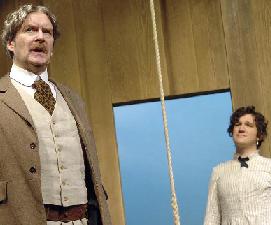SITE GUIDE
SEARCH
REVIEWS
REVIEW ARCHIVES
ADVERTISING AT CURTAINUP
FEATURES
NEWS
Etcetera and
Short Term Listings
LISTINGS
Broadway
Off-Broadway
NYC Restaurants
BOOKS and CDs
OTHER PLACES
Berkshires
London
California
New Jersey
DC
Philadelphia
Elsewhere
QUOTES
TKTS
PLAYWRIGHTS' ALBUMS
LETTERS TO EDITOR
FILM
LINKS
MISCELLANEOUS
Free Updates
Masthead
Writing for Us
A CurtainUp  London Review
London Review
 London Review
London ReviewCloud Nine
|
Friendship with men is a fine thing!— Clive
|

James Fleet as Clive and Bo Poraj as his wife Betty.
(Photo: Hugo Glendinning)
|
Caryl Churchill's curious 1979 play, Cloud Nine, gets a revival at the Almeida with direction by Thea Sharrock. The origin of the production was with Max Stafford Clarke's company Joint Stock as an improvised piece.
The first act is separated from the second by an interval of around a century but the characters have only aged twenty five years. Churchill also cast the parts unusually swapping gender and race, so that in Victorian times, the colonial wife Betty is played by a man (Bo Poraj) and the man playing Clive (James Fleet) in 1979 plays a young girl, Cathy. Joshua, the African servant, is played by a white man (Mark Letheren). It is easy to see why drama colleges are interested in the play for the way in which the actors are cast out of their comfort zones.
The first act is set in the days of the British Empire somewhere in Africa in the reign of Queen Victoria and is almost a Footlights sketch with its send up of the forced manners of the English colonising classes. Betty is married to Clive who is having a passionate affair with the independent Mrs Saunders (Sophie Stanton). Meanwhile Betty longs for her lover Harry Bagley (Tobias Menzies), who also likes boys. "You have been thought of where no white woman has been thought of before" says Harry enigmatically!
It is all passion and throbbing bodices, heat and parasols and over the top dialogue and very, very funny. The relationships are secret and unspoken of publicly and hypocrisy reigns.
Betty and Clive's son Edward (Nicola Walker) is attached to his sister's doll and has been sexually abused by a close friend of the family.
Joanna Scanlan playing Maud, Betty's mother and looking not unlike Queen Victoria, explains the roles, declaring "The men have their duties and we have ours." Men mop their brow and talk about the rebellion they have to quell and the women they have to protect. There is a nanny Ellen (Sophie Stanton) who hates children and lusts with a Lesbian passion for Betty.
In the second act, Gerry (Mark Letheren), a previously unseen character opens with a description of a casual gay encounter on a London suburban train. It is uncomfortable to listen to because it is shockingly promiscuous and as far away from romance as can be. His boyfriend is the grown Edward (Bo Poraj) who is working as a gardener.
The relationships are muddled with heterosexual and homosexual couples and the children seem to be being brought up in a kind of commune. Nicola Walker as Betty, now a matron gives a lyrical but startling monologue on the joys of pleasuring oneself with uncharacteristic frankness for that generation of refined, colonial, middle aged women. Be warned there are scenes in Cloud Nine which are both verbally and physically sexually explicit.
I greatly appreciated Bo Poraj both as the delicate Betty in a sensitive non-camp portrayal of a young woman and as Eddy, grown up and able to live openly as a gay man. Nicola Walker makes the Edward/Betty transition the other way round —from the energetic, competitive young boy in his sailor suit desperate to be included, to the ghastly middle aged Betty in felt hat and tweeds. James Fleet and Tobias Menzies seem to enjoy their contribution to that portion of the map of the world coloured red with their stiff upper lip and determination to protect the women. In the second act James Fleet wears a pink frock and skips about, inevitably a rather fey performance, while Tobias Menzies becomes Martin, in a rocky marriage, husband to Betty's daughter Victoria (Joanna Scanlan). The wooden fort set of the first act becomes a park covered seating area on a perfect circle of lush green lawn for the twentieth century.
Cloud Nine still has mysteries for me. Maybe it makes sense that it isn't the creation of one focussed writer but of many? It is one of those plays you will have you asking yourself what is it all about? Is ii about sex? Are we different from the Victorians? Are we more open and up front? Are we happier? Caryl Churchill gives a very good piece of advice, "You should ask your mother what she would do and do the opposite."
|
CLOUD NINE
Written by Caryl Churchill Directed by Thea Sharrock With: James Fleet, Bo Poraj, Marl Letheren, Tobias Menzies, Bo Poraj, Nicola Walker, Joanna Scanlan, Sophie Stanton Design: Peter McKintosh Lighting: Peter Mumford Sound: Gregory Clarke Running time: Two hours 20 minutes with one interval Box Office: 020 7359 4404 Booking to 8th December 2007 Reviewed by Lizzie Loveridge based on 1st November 2007 performance at the Almeida, Upper Street, London N1 (Tube: Angel Islington) |
|
London Theatre Tickets Lion King Tickets Billy Elliot Tickets Mary Poppins Tickets Mamma Mia Tickets We Will Rock You Tickets Theatre Tickets |




